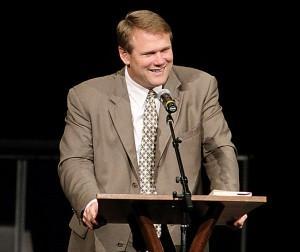Westmont Magazine How Do We Live a Christian Life That Counts?
by Gayle D. Beebe, Ph.D.
President
I love George Herbert, who ranks as one of our greatest poets. He touched me with his rich poetry as I entered into my own Christian life. I appreciate Herbert’s understanding of the Christian life and find in his writings a grand invitation to begin our own life with God and grow in him. Herbert takes the disparate parts of our life and weaves them into a meaningful whole.
How do we enter into a life with God that produces the fruit of the Spirit: love, joy, peace, patience, kindness, goodness, faithfulness, gentleness and self-control? People rarely exhibit these behaviors automatically or consistently. It takes time, devotion and the love of God actively working in our life. George Herbert gives us a great overview of the Christian life as we consider how to cultivate the fruit of the spirit along each step of our spiritual journey.
A distinguished, well-educated man, Herbert lived from 1593-1633 and served as a pastor of a local parish during a time of great unrest and war. He asked profound questions: How do we stay close to God? How do we find God in the midst of our daily life? He gave his brilliant answers in a series of 165 poems collected under the title, “The Temple.” One is based on Colossians 3:3, “My life is hid with Christ in God.”
My words and thoughts do both express this notion,
That Life hath with the sun a double motion,
The first Is straight and our diurnal friend,
The other Hid and doth obliquely bend,
One life is wrapt In flesh and tends to earth,
The other winds towards Him whose happy birth
Taught me to live here so, That still one eye
Should aim and shoot at that which Is on high:
Quitting with daily labor all My pleasure,
To gain at harvest an eternal Treasure.
Herbert compares our life to the double motion of the sun. The double nature of our life with God entails both the seen and the unseen, the temporal and the eternal, the sacred and the mundane. In this poem he introduces the idea that the Christian life is lived on two levels. Both the words he chooses and the pattern he constructs illustrate the way our life is conformed to the image of Christ over time. On the horizontal level, we mark our life by various experiences. But on the vertical level, which is hidden, our spiritual life is being conformed to the image of Christ over time. Herbert suggests that in our most mundane activities we encounter God as his spirit guides our spirit.
Herbert masterfully depicts entering the spiritual journey in his poem “The Altar” by the words and the form of the stanzas. He wants us to have both a visual and an aural understanding of our life with God.
A broken A L T A R, Lord thy servant rears,
Made of a heart, and cemented with tears:
Whose parts are as thy hand did frame;
No workman’s tool hath touched the same.
A heart alone
Is such a stone
As nothing but
Thy power doth cut
Wherefore each part
Of my hard heart
Meets in this frame,
To praise thy name.
That if I chance to hold my peace
These stones to praise thee may not cease.
Oh let thy blessed sacrifice be mine
And sanctify this A L T A R to be thine.
Herbert describes our life as set on the altar of Christ. It becomes a place where the living sacrifice of Christ is made manifest. This is one way we become a devoted follower of Christ.
I often think about our responsibility as Christians and what people experience when they meet us. Do they encounter the love of Christ? Or do they experience something that distracts them from his love? When I was a pastor, I frequently did funerals, and one of the most memorable honored a man who had lived a long time as a devoted follower of Christ. A friend at the service stood up and said, “I saw Christ in Frank long before I saw Christ.” So often, the first glimpse people have of Christ is the way Christians present him through the way they live.
Herbert seeks to give us an appreciation for the sacrifice of Christ and what he did on the cross. He laid out a way for us to live life and to follow his teachings in the most meaningful way.
I wrote about Herbert and other believers in my book “Longing for God: Seven Paths toChristian Devotion” to explore what it means to enjoy a life with God that counts. We hope our students experience this at Westmont and that God becomes a force in their lives amidst all the challenges they will face in the future. We want them to learn to live for him while preparing to serve society.
